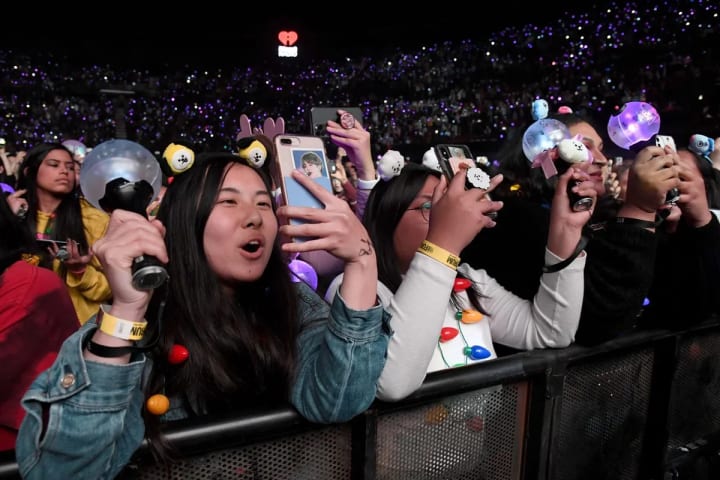Exploring The Psychology Of Fandoms
Understanding the devotion to fan culture sects

In today’s world, fandom has become a powerful force. From movies, television shows, books, anime, and sports, fans have shown an incredible level of devotion, often going to great lengths to express their love and support for their favorite franchises, series, artists, or teams.
The psychology behind fan culture is such a fascinating area of study that seeks to understand the motivations, behaviors, and emotions that drive people to become deeply engaged in fandoms. So in this article, we will dive into the psychology of fan culture and find out why people form such strong attachments and the profound impact it has on their lives.
Defining Fandom
Fandom refers to a community or subculture of passionate and dedicated fans who share a common interest, enthusiasm, and appreciation for various forms of entertainment, including movies, TV shows, books, music, anime, video games, and sports.

Members of a fandom actively engage in activities related to their shared interest, such as attending conventions, participating in discussions, creating fan art, writing fan fiction, cosplaying, and supporting their favorite artists or franchises. Fandoms provide a sense of community as it allows people to connect with other like-minded individuals to express their love for the object of their fandom.
The Need For Belonging
One of the fundamental psychological motivations that drive people to participate in fan culture is the need for belongingness. Social Identity Theory explains how people derive their sense of self and identity from the groups they belong to and associate with.

In the context of fan culture, fans form a social identity around their favorite franchises or media, which provides them with a sense of belonging, group identification, and even validation. By engaging in fan activities, such as attending conventions, joining online forums, or participating in cosplay, fans can connect with others who understand and appreciate their passions, creating a sense of acceptance and validation.
Identity And Expression
By following their desires to feel a sense of belonging, fans often use their involvement in fandoms as a means of self-expression and identity formation. Academic theories such as Uses and Gratifications Theory suggests that people actively seek out and engage with media in order to fulfill specific psychological needs.

So in the case of fandoms, people who participate in fandoms often do it to satisfy various needs such as social interaction, entertainment, and self-expression. By immersing themselves in a particular fandom, people can explore different aspects of their own identity and find a sense of purpose and meaning.

Through activities like cosplay, creating fan art, writing/reading fan fiction, or even adopting the language and symbols associated with a particular fandom, fans can express their creativity, engage in personal narratives, and establish a unique sense of self within a larger community.
Escapism And Fulfillment
While fan culture sounds like a fun way to meet some new people, it actually also provides people a sense of personal recovery. For fan cultures that are centered around fictional worlds or immersive narratives, it actually provides people the perfect platform for them to practice escapism.
Escapism allows people to immerse themselves in fictional worlds that offer temporary respite from the pressures and challenges of everyday life. While setting some time to unwind and get into a story sounds great, it actually tells us a lot more than you think.

Being a fan of an immersive fictional series can offer a sense of adventure, excitement, and emotional fulfillment that may be lacking in other aspects of people’s lives. Whether if this is by bad luck or a general sense of unfulfillment, people who identify with beloved characters and narratives can experience a range of emotions, from joy and excitement to sadness and heartbreak that they might not personally experience themselves.
These emotional connections not only provide a source of entertainment, but also a sense of emotional catharsis. By going through this catharsis, it gives fans a means to navigate and make sense of their own emotions in a controlled and predictable context.
Toxic Aspects Of Fan Culture
While fan culture can be a source of joy and fulfillment, it also has its dark side. Like most good things in this world, there are going to be some negative aspects and within fan culture it comes in the form of toxic and obsessive behavior.

Whether if they are trolls or people with bad vibes, there are a significant chunk of fans who adopt extreme positions and attitudes when they are engaging in social interactions or activities. This phenomenon can contribute to the development of intense devotion, exclusivity, and even toxic behaviors within fan communities.
Odd Obsessions
Within any fan culture, there are always going to be some people who are more of a die hard fan than others. This intense devotion fans exhibit can be attributed to another academic theory called Parasocial Interaction Theory.
The theory states that people who ingest a lot of media/fiction would likely develop a one sided relationship status to the media/fiction they are taking in. While the cause of these devotions varies from person to person, fans who develop parasocial relationships often do it with celebrities or fictional characters, and develop illusions of intimacy, friendship, and identification onto them.

Fandoms such as anime, K-pop, and J-pop idol groups often showcase these kinds of devoted fandoms the most, and we can see the extent that they are willing to go to show off their devotion. Whether they spend an absurd amount of money at conventions, or buy doubles or triples of entire collections, their devotion can sometimes come off as odd and extra. However, it is important to note that these devoted followers can appear in any fan culture.
While these parasocial relationships and celebrity worship provide fans with a sense of purpose, inspiration, and possibly an escape from feelings of loneliness or dissatisfaction in their own lives. It is essential to recognize and address these negative aspects, promoting a more inclusive, respectful, and empathetic fan culture that celebrates diversity, promotes empathy, and respects the boundaries of others.
Do You Get Fan Culture Now?
The psychology of fan culture provides valuable insights into the reasons behind the deep devotion fans exhibit toward their favorite franchises, artists, or teams. By understanding the motivations, behaviors, and emotions that drive fan culture, we can appreciate the powerful impact it has on individuals’ lives.

From feeling the need to belong to using fandom as a form of self-expression, fan culture provides a sense of community, identity, and joy to millions of people worldwide. However, it is crucial to acknowledge the potential for toxic behaviors and not fall down the rabbit hole of pure obsession, because at the end of the day, fandoms are a way to meet some cool people and make some friends.
If you liked what you read, be sure to follow for more related content!
About the Creator
Jay Kobayashi
A starving writer from LA who aspires to be plagiarized one day. I like to write about academic pieces that identifies philosophy and psychology in pop culture, and sometimes random fun pieces that interests me or the algorithm!






Comments
There are no comments for this story
Be the first to respond and start the conversation.